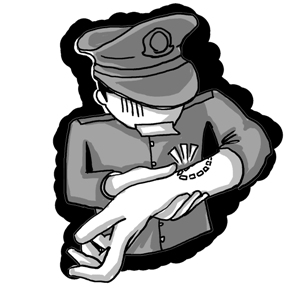METRO SHANGHAI / FENG YU'S COLUMN
Police-biting verdicts show justice in action

Illustration: Lu Ting/GT
Malaysia Airlines flight MH370 has been casting a shadow over the entire country since it went missing last Saturday. People around the world continue to pray for all of the 239 people on board, including 154 Chinese nationals, even though the odds of a miracle now appear sadly slim after six days and nights.
Here in China, the timing of this unfortunate event invariably made it a topic of discussion at the just-concluded 2014 NPC and CPPCC annual sessions in Beijing. And coming so quickly on the heels of the Kunming train station terrorist attacks which claimed 29 lives, many still-unsubstantiated theories have been put forward to connect these killings with the missing plane. For the time being though, all theories pertaining to the lost aircraft remain little more than guesswork and speculation as rescuers struggle to determine its fate.
Against such events, one could easily forget that March is also a month marked by many less troubling observances. March 5, for instance is Learn from Lei Feng Day in China; while March 8 is International Women's Day; March 12 is Arbor Day, and March 15 is World Consumer Rights Day.
In the run-up to these observances, the media exposure usually kicks up like a gust of wind - only to die down just as quickly once the moment passes. On March 5, we saw, as usual, slogans exhorting the public to serve the heart and soul of the people by studying the example of Lei Feng, a soldier who became famous for his selfless acts of kindness in the 1960s. March 5 was the day Chairman Mao set to remember him and the spirit of his deeds.
But while media reports on this day are normally stuffed with glowing tales of good Samaritans, most of these stories vanish from view the following day.
The same pattern can be witnessed on other holidays. I think it's too cynical to say that the public only sees this sort of coverage as a platform for officials and organizations to extol their own virtues. The public is not so easily tricked as many might believe.
But the public also needs long-term displays of dedication to illustrate that their interests are being protected. The media should consider this fact and resist the temptation to be caught up in hollow one-day spectacles.
Actually, some good news has attracted the notice of several foreign friends. Jing'an District People's Court handled two cases Tuesday in which two men were sentenced for attacking police officers. The two men were charged with obstructing official business. One defendant was sentenced to five months of detention for biting a police officer during a traffic stop, the Global Times reported. The court has handled nine such cases this year.
This is not the first time for us to hear about a police-biting case in Shanghai. According to news reports on March 2, a woman in Shanghai's suburban Jiading district was also charged with obstruction of official business after she bit a police officer when the restaurant she and her husband ran was investigated for possible illegal waste oil processing, according to a press release from the Jiading District People's Prosecutor's Office. The woman was sentenced to one year in prison for the attack.
The prosecutor's office has seen a 60 percent increase in the number of obstruction of official business cases over the last year, although no further details were released.
My foreign friends were puzzled by all of this. What explained this large number in cop-biting cases? And if an attack on a police officer is regarded as an attack on the justice system, why were the defendants punished so lightly?
For the first question, I think the answer is quite simple since my friends are from the US. Chinese people are not allowed to possess guns, so when they think they are unfairly treated by others who appear to be stronger, it's natural for them to seek revenge with other, perhaps more natural, means. In the face of well-equipped police officers, teeth may be the best choice.
Let's not forget that teeth aren't reserved for police in China. Such moves are routinely employed among squabbling children and even fighting adults. During the heat of the moment, it's understandable if instinct kicks in.
On the second point, I don't think the sentences were light or lenient in the slightest. Spending several months to a year behind bars for biting a cop is still harsh, especially when considering the consequences one would likely face for committing the same offense against a civilian.
If anything, I believe that this shows a growing degree of nuance in China's justice system, which should be recognized as a stride toward progress.
The author is the managing editor of Global Times Metro Shanghai. fengyu@globaltimes.com.cn

